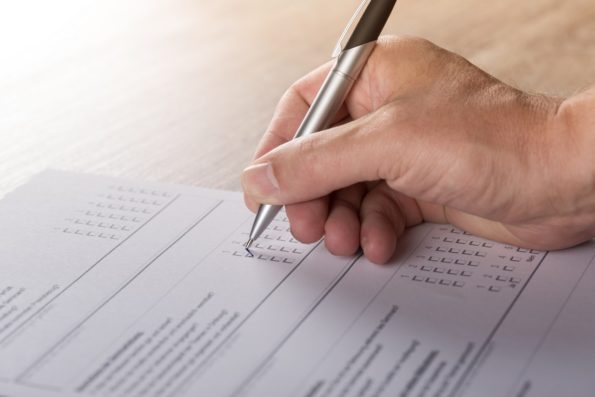[dropcap]In[/dropcap] the United States in 1800 felony disenfranchisement did not exist. After the war ended southern states were bitter over their loss of one of their biggest economic staples, slavery. Racial discrimination was common in those times and most people didn’t want African Americans and other former slaves to be able to contribute in one of the most important duties of citizenship. So, states began to make laws to take away the rights of someone who had committed a crime in an attempt to take away the voting rights of African Americans who at that time made up the majority of people who had some sort of time in jail. Then by 1870 eighty percent of the states in the U.S. had laws restricting felons from the right to vote. Using felon disenfranchisement laws divides the people of the United States and should not be allowed.

Before we begin I should probably explain what a felon is. A felon is any person who was convicted of a felony crime and a felony crime is considered a more serious crime. According to Schatz Anderson and Associates the most common felony crimes in the United States include drug abuse violations, DUIs, and disorderly conduct. One single offense of any of these crimes can ruin a person’s life.
According to The Sentencing Project, currently in the United States, only 12 states allow felons to vote after they have completed their time in prison and 2 states that actually allow felons to vote while in prison. While 19 states allow it after the sentence, parole, and probation and there are three states where felons are completely banned from voting for the rest of their lives. For those nineteen states that allow it after parole and probation, that is in essence still taking away their rights for most of their lives because depending on the crime probation can last as long as 35 years.
[perfectpullquote align=”left” bordertop=”false” cite=”” link=”” color=”” class=”” size=””] Only 12 states allow felons to vote after they have completed their time in prison and three states completely ban felons from voting[/perfectpullquote]
Felon disenfranchisement creates a racial divide in the United States and can affect the outcome of major elections. According to The Sentencing Project more than 2 million African Americans or almost eight percent are unable to vote because of felony convictions compared to just two percent of non-African Americans. Since, most African Americans vote Democrat, that many votes could sway a close election such as the 2000 election of Gore (Democrat) vs Bush (Republican). The state of Florida had more than 857,000 inmates and former felons that were not allowed to vote in the election. Sociologist Christopher Uggen estimates that a little under 70 percent of those felons would have voted for the Democratic candidate. He also estimated that about 27 percent of those 857,000 would have actually voted to give the democratic party an extra 155,000 votes beating out George W. Bush by about 85,000 votes and changing the course of the election and possibly a segment of U.S. history because Al Gore might not have sent soldiers into the middle east after 9/11 like George W. Bush. Felon disenfranchisement hurts both people with and without felonies.
Felon disenfranchisement also causes people with felons to be isolated from real society. When felons can’t vote, they feel as though they aren’t part of the community and giving them the right to vote helps them to blend back into society. According to Christopher Uggen, a sociologist from the University of Minnesota, allowing felons to vote helps the feel more integrated into society because they’re contributing to the “common good”.
According to a Sentencing Project study that tracked felons released from 1997 through 2000 those who voted were less than half as likely to be arrested than those who didn’t or weren’t able to vote. People often get arrested for crimes at a young age because they were around bad people or they were young and made a bad judgement call.One simple mistake made in someone’s younger years of life or a bad judgement call made can ruin a person’s life, but when you give that person the right to vote, you give them a second chance which everyone deserves. Technically felon disenfranchisement is unconstitutional according to the eighth amendment of the United States constitution. The eighth amendment states that any kind of excessive sanctions and calls for punishment are prohibited. Therefore when states say that felons can’t vote at all they are committing an unconstitutional act and violating the basic set of rules that the forefathers lay down for this country. That’s why felons should be able to vote after they complete their time in jail. They have done their time and paid their dues to society by going to prison and for that they deserve the right to complete one of the greatest duties in United States citizenship.
Only about 40 percent of non-felons go out to the polls, according to Reynolds Holding of TIME Magazine, so allowing felons to vote after they have completed their sentence in jail helps strengthen the democracy of the United States by getting more people to take part in the democratic process. This not only makes felons feel more connected, but helps people see felons as regular people and not a group of outcasts.
[perfectpullquote align=”left” bordertop=”false” cite=”” link=”” color=”” class=”” size=””]Only about 40 percent of non-felons go out to the polls[/perfectpullquote]
There is also a large number of people that disagree with felon voting. This The New Times article claims that, “No they are not a party of society. There is really no polite way to say this so here’s the thing; they are put behind bars because they have committed a crime.” This is an invalid reason to say that felons or prisoners shouldn’t be able to vote because most prisons other than maximum security have some sort of access to current events, news, or politics. Due to this connection with the rest of the world felons should still have the right to take part in the democratic process.
Felons face unfair disenfranchisement laws that they have to deal with in some cases, their whole lives for something that might have been just a minor mistake that they made when they were young. These laws were originally made to keep a race from feeling as though they were not citizens and taking away one of their most basic rights as Americans Giving these people a second chance at fitting in with society and participating in a democratic event would be beneficial to both felons and non-felons. In general, allowing felons to vote will get more people to the polls and strengthen the democratic system of the United States.
Featured image by Pixabay

your formatting is a little weird, but overall, good post